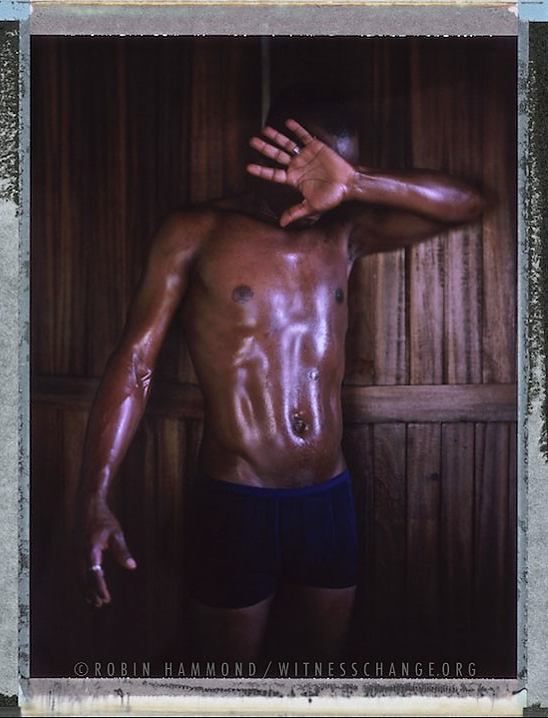Yves Serges / Cameroon
“It is with great sadness that I have to renew my story on this piece of paper, hoping that by speaking one day I’ll find a favorable outcome for me, my acquaintances and to other people. Even if only for this tragedy not to happen to them.
It was then that on January 28, 2011, I experienced the tragedy that haunts my mind, for me that day was the end but God does not sleep.
It was 2am when I believed I was opening the door to my alarmed and topless cousin of about 20 years old, silly of me because about fifteen motorized boys averaging 20 to 30 years old broke in my apartment in Bonabéri, an industrial suburb of the Coast. Dragging me by force, they brought me with them in a nearby neighborhood. They seriously beat us while asking us to confess our homosexuality and to lead them to our accomplices, given my resistance, it’s around 4am, after all forms of torture meaning having to sit on a beer bottle and making it enter the anus or making love in front of them. Still, despite my resistance to denounce, they judged it was time to take the next step which was to burn me alive in big trucks wheels that were in this intersection, no sooner said than done, that’s when I found myself in these wheels naked, they removed the fuel from a motorcycle and poured it on me.
It’s when they wanted to lit the fire that they were interrupted by the guards in my neighborhood, who immediately after being alerted came on site. They objected to it for a long time, several approaches have even been undertaken, my cousin was released a little before me. As for me, it’s around 7am that my family retrieved, I can even say, that molested body for the hospital, and as if that was not enough, they went to my apartment looting and threatening to burn the house if my family didn’t moved in the shortest possible time, I even went out of town to go to a village in order to regain my health for 6 months.
It’s when I came back to town, thanks to my association where I am an activist, that I now have regain a taste for life, in spite of, the fact that after three years, I still see the same scenario play in my head, even the noise of a bike makes me deeply scared, or when I meet someone who says has seen me in Bonaberi.
While hoping that one day it will go, I’d like to change and share my experiences with those who want to be able to banish homophobia.”





My heart bleeds. so sad. i hope you can move on. be strong. there are millions who do support and accept you. xx
You are so brave and strong. I am so sorry you have experienced something so horrific. I pray you will have peace and love. I live in the usa and cannot imagine this hate. You are an inspiration and YOUr dedication amazes me.
-Michelle
You are so incredibly brave and inspiring to share your story. I wish I could erase the fear and the awful memories for you. I wish you were able to live in a world without fear. I will continue to do every large and small thing I can to contribute to the fight against homophobia. I wish you all the happiness in the world
THEY: horrible, hurtful, sad, pathetic. YOU: resounding, strong, terrified, living My heart: broken,, crying, losing hope for this world we live in.; God bless and protect you from further harm
I apologize if this is a silly qUestion. But why do these people so strong of hate for gay men tourture them with sexuAl acts? They seem to hate gay people so much but then want to watch them perfer sexual acts with other men?
Your story is terrifying, i feel for you as this is awful what they did. You must be very strong to keep going. I send you my live and wish You a happy life ahead. You did not deserve to be hurt in this way, may you find happiness
SO DISGUSTING. I AM SO SORRY THIS HAPPENED to YOU. I HOPE THE SCUM THAT DID THIS TO YOU GET WHAT THEY DESERVE. I WISH YOU WELL IN THE FUTURE. STAY STRONG, LLOYD AUSTRALIA
I’m so sorry that that happened to you.
I wish that there’s something I could do to help you
I hope that you find peace and love. And that you get to help others.
I don’t know you but I love you.
Your story reached the Netherlands.